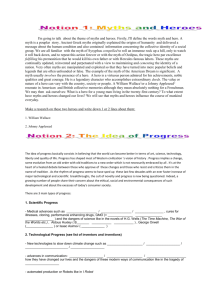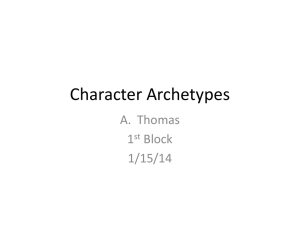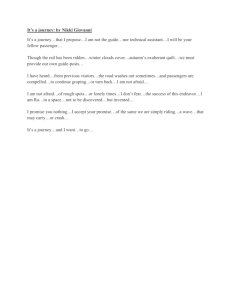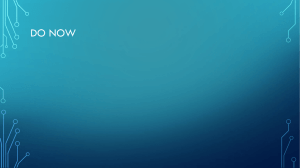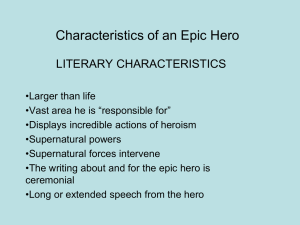The Power of Myth - The Hero s Journey in the Transformation of
advertisement
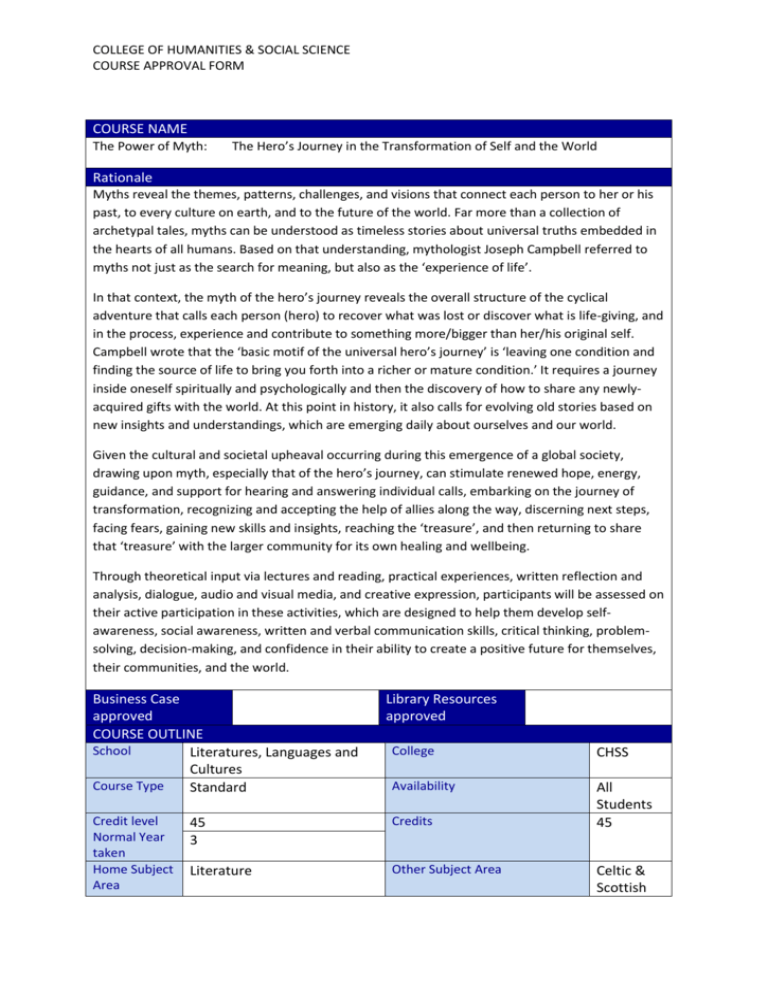
COLLEGE OF HUMANITIES & SOCIAL SCIENCE COURSE APPROVAL FORM COURSE NAME The Power of Myth: The Hero’s Journey in the Transformation of Self and the World Rationale Myths reveal the themes, patterns, challenges, and visions that connect each person to her or his past, to every culture on earth, and to the future of the world. Far more than a collection of archetypal tales, myths can be understood as timeless stories about universal truths embedded in the hearts of all humans. Based on that understanding, mythologist Joseph Campbell referred to myths not just as the search for meaning, but also as the ‘experience of life’. In that context, the myth of the hero’s journey reveals the overall structure of the cyclical adventure that calls each person (hero) to recover what was lost or discover what is life-giving, and in the process, experience and contribute to something more/bigger than her/his original self. Campbell wrote that the ‘basic motif of the universal hero’s journey’ is ‘leaving one condition and finding the source of life to bring you forth into a richer or mature condition.’ It requires a journey inside oneself spiritually and psychologically and then the discovery of how to share any newlyacquired gifts with the world. At this point in history, it also calls for evolving old stories based on new insights and understandings, which are emerging daily about ourselves and our world. Given the cultural and societal upheaval occurring during this emergence of a global society, drawing upon myth, especially that of the hero’s journey, can stimulate renewed hope, energy, guidance, and support for hearing and answering individual calls, embarking on the journey of transformation, recognizing and accepting the help of allies along the way, discerning next steps, facing fears, gaining new skills and insights, reaching the ‘treasure’, and then returning to share that ‘treasure’ with the larger community for its own healing and wellbeing. Through theoretical input via lectures and reading, practical experiences, written reflection and analysis, dialogue, audio and visual media, and creative expression, participants will be assessed on their active participation in these activities, which are designed to help them develop selfawareness, social awareness, written and verbal communication skills, critical thinking, problemsolving, decision-making, and confidence in their ability to create a positive future for themselves, their communities, and the world. Business Case approved COURSE OUTLINE School Literatures, Languages and Cultures Course Type Standard Credit level Normal Year taken Home Subject Area Library Resources approved College CHSS Availability All Students 45 45 3 Credits Literature Other Subject Area Celtic & Scottish COLLEGE OF HUMANITIES & SOCIAL SCIENCE COURSE APPROVAL FORM Studies, Religious Studies (Divinity), Counsellin g& Psychothe rapy, Social & Political Science UG Mode of Course Level Class and Assignments Study Summary Description The purpose of this course is to explore the power of myth, especially in the Hero’s Journey, as it provides patterns and themes embedded in the human experience of personal and societal transformation. The course will follow the traditional hero’s journey cycle of receiving a call, responding to that call, facing of inherent challenges and obstacles, meeting and accepting supportive allies, finding the ‘treasure’, and returning to share recovered or discovered gifts with the larger community. It also will provide and facilitate opportunities for participants to explore these themes and patterns in their own lives and communities. Entry Requirements (not applicable to Visiting Students) Pre-requisites Co-requisites Prohibited combinations Other requirements Information for Visiting Students Course delivery Information Delivery Quota 1-19 June Learn enabled period 2015 Days & Times Monday - Friday from 10 am. – 1 p.m. (3 hours @ day for 3 weeks) of whole class sessions Detailed description Course Description This course will be divided into three related segments: Week One - The Power of Myth and the Call This week will focus on research related to myth and its prevalence and place over time. Woven throughout that study will be local examples and case studies from numerous sources, including Celtic Wonder Tales; relevant Celtic and Scottish history; modern Gaelic poetry, such as Sorley Maclain’s ‘Cave of Gold’ and ‘Cuillin and Aonghas MacNeacail’s ‘Seeking Wild Salmon’; Scots COLLEGE OF HUMANITIES & SOCIAL SCIENCE COURSE APPROVAL FORM poetry, such as ‘Thomas the Rhymer’; and related music. Participants also will engage in experiential activities designed to help them reflect upon, discuss, analyze, and integrate what they are learning. Week Two – The Hero’s Journey and the Response During the second week the focus will be on classic elements of the hero’s journey and the journey’s role in personal transformation. Participants will reflect upon and analyse verbally and in writing their perception of where they are in the journey cycle; archetypes that seem currently active in their lives; obstacles and barriers they face; allies they sense are present to help, protect, and support them; and various tools that facilitate transformation. One of the myths explored in this exploration of personal transformation will be the Grail myth Parzival. Week Three – The Transformation of the World and the Return In this final week, participants will focus on the transformation of society and the world through the return of the hero to share the lessons learned and gifts attained on the journey. Building on lessons from the previous two weeks, they will reflect upon their own learning and gifts and explore together the Wizard of Oz myth both theoretically and experientially – drawing upon insights and suggestions by author, researcher, and human potential pioneer Jean Houston in her book The Wizard of Us. Dr. Houston, who worked with Joseph Campbell and currently serves as Chancellor of Meridian University in the USA, designed and teaches a PhD program on Leadership and Social Transformation. Breakdown of learning & teaching activities Total Hours: 200 Lectures: 20 Seminar/Tutorials: 12 Fieldwork: 0 Practical: 13 Summative Assessment hours: 0 Programme level Learning & Teaching hours: Directed learning & independent learning hours: 155 Additional information Weighting of Coursework 100% summative assessments Exam information Exam diet Paper name Resit information Hours: minutes Stationery requirements COLLEGE OF HUMANITIES & SOCIAL SCIENCE COURSE APPROVAL FORM List of Learning Outcomes LO 1 Demonstrate knowledge of and ability to articulate verbally and in LO 2 LO 3 LO 4 LO 5 LO 6 writing a basic understanding of myth, the hero’s journey, and their relationship to personal and social transformation. Participate effectively in a range of collaborative discussions and activities with others in a way that builds on others’ ideas, while expressing one’s own perspective clearly and persuasively. Analyse and critique the elements of myth and components in the hero’s journey cycle as they relate to literature and related material presented during the course and as they apply to and life and society. Respond thoughtfully and respectfully – both verbally and in writing – to challenges and opportunities that arise, when addressing individual calls to personal and social transformation. Identify and manage one’s emotions and behavior, especially in the face of transformational challenges that emerge during the course. Evaluate the effectiveness of materials and processes used to explore myth and the hero’s journey during this course. LO 7 LO 8 LO 9 LO 10 Detailed Assessment Information Formative Feedback Event (Nature and Timing) Elements Of Summative Assessment (With Weightings) Relationship Between Assessment and Learning Outcomes Relationship to Programme Assessment Spine/Plan COLLEGE OF HUMANITIES & SOCIAL SCIENCE COURSE APPROVAL FORM Main Graduate Attributes Research and Enquiry: Be able to identify, define and analyse problems and identify or create processes to solve them. Be able to exercise critical judgment in creating new understanding. Be able to ask key questions and exercise rational enquiry. Be able to critically assess existing understanding and the limitations of their own knowledge and recognise the need to regularly challenge all knowledge. Recognise the importance of reflecting on their learning experiences and be aware of their own learning style. Personal and Intellectual Autonomy: Be open to new ideas, methods, and ways of thinking. Be creative and imaginative thinkers. Be independent learners who take responsibility for their own learning, and are committed to continuous reflection, self-evaluation and self-improvement. Be able to make decisions on the basis of rigorous and independent thought, taking into account ethical and professional issues. Be able to use collaboration and discussion effectively to test, modify and strengthen their own views. Be intellectually curious and able to sustain intellectual interest. Be able to respond effectively to unfamiliar problems in unfamiliar contexts. Have a personal vision and goals and be able to work towards these in a sustainable way. Communication: Make effective use of oral, written and visual means to critique, negotiate, create and communicate understanding. Use communication as a tool for collaborating and relating to others. Further their own learning through effective use of the full range of communication approaches. Seek and value open feedback to inform genuine self-awareness. Use effective communication to articulate their skills as identified through selfreflection. Personal Effectiveness: Appreciate and use talents constructively. Be able to create and harness opportunities. Be able to manage risk while initiating and managing change. Be responsive to their changing surroundings, being both flexible and proactive. Have the confidence to make decisions based on their understandings and their personal and intellectual autonomy. Be able to flexibly transfer their knowledge, learning, skills and abilities from one context to another. Be able to work effectively with others, capitalizing on their different thinking, experience and skills. Organisation Course organizer Course secretary Dr. MaryCatherine Burgess Exam Board Convenor Taught in Gaelic? Marking Scheme Additional costs COLLEGE OF HUMANITIES & SOCIAL SCIENCE COURSE APPROVAL FORM Additional Information I have asked Dr. Emma Dymock Clark, who currently lectures and serves as a tutor in Celtic and Scottish Studies, if she would be a guest lecturer during part of the first week of this course, and she has agreed. Keywords Course proposal information Course proposer Dr. MaryCatherine Burgess Url for supporting documentation School Specific Requirements This section can be expanded and adjusted as required for schools to include material that is specific to their own local requirements or for programmes that may have, e.g. a professional requirement

